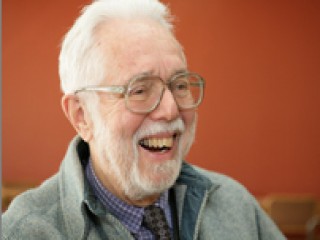
Harvey Cox biography
Date of birth : 1929-05-19
Date of death : -
Birthplace : Malvern, Pennsylvania
Nationality : American
Category : Famous Figures
Last modified : 2011-06-03
Credited as : Professor of theology, ,
Harvey Cox was professor of theology at Harvard Divinity School. In the mid-1960s he achieved international prominence because of his book The Secular City. After that he was a leading interpreter for the American church of the theological significance of cultural dynamics.
Harvey Cox was born in 1929 and grew up in Malvern, a suburb of Philadelphia, Pennsylvania. His religious background was Baptist, and he described his faith journey not as a steady climb up the ladder of spiritual development, but rather as "desultory and meandering" with sometimes "sickening reversals and absurd contradictions." He titled an autobiography Just As I Am (1983) after the familiar gospel song, one verse of which he found especially meaningful:
Just as I am, though tossed about With many a conflict, many a doubt, Fightings and fears within, without O Lamb of God, I come, I come.(Charlotte Elliott)
The metaphor of a faith journey is important to understanding Cox, for his creative theology was done less under the constraints of academia than in response to some exciting places he had been—Gdansk, Berlin, New Delhi, Cuernavaca, Mexico City, Rome, Tehran, Hiroshima—and experiences he had. Cox did theology by thinking through the implications of living where history was being made, and he spoke of the importance for him of "participating in history, not just watching it happen on TV." He was therefore concerned not so much with supposedly "eternal" truths as with truth for today, truth for action, and he suspected that a faith which responded primarily to ideas was more likely to be idolatrous and less likely to be redemptive than one that responded to events and experience.
The summer following his junior year in high school (1946) Cox responded to a call from the United Nations Relief and Rehabilitation Administration for volunteers to help ship cattle to Europe to replace the herds that had been devastated by war. His boat went to Gdansk, Poland. After completing his academic degrees—University of Pennsylvania (B.A.), Yale (B.D.), and Harvard (Ph.D.)—and following two brief terms as a college chaplain, first at Oberlin College and then at Temple University, Cox spent a year (1962-1963) in Berlin as an ecumenical fraternal worker. Having experienced this nexus of East-West tension, Cox returned to the United States and joined the civil rights struggle. He was in prison in Williamstown, North Carolina, when installed (in absentia) as assistant professor of theology and culture at Andover Newton Theology School in Boston.
Shortly thereafter Cox published The Secular City (1965), the cover adding "a celebration of its liberties and an invitation to its discipline" but formally subtitled "Secularization and Urbanization in Theological Perspective." Written in a popular style, it became an international best-seller (translated into 11 languages) and led to his appointment at Harvard. In that book Cox argued that secularization is itself a result of biblical faith and that secularization sets the agenda which gives meaning to the church's mission. The biblical commandment "no other gods" led historically to the "disenchantment" of nature and the relativization of politics and values. Therefore (following Bonhoeffer), the church must learn to "speak in a secular fashion of God," as the liberating power operative in nature and history that is discerned through the model of the Exodus.
In his second major book, The Feast of Fools (1969), described by Cox as "my favorite" and "intended as a companion piece," he explored the very different topics of festivity and fantasy, proposing that in addition to "world-changers" there is a need for "life-celebrators." Indeed, a world experiencing re-creation needs the festivity appropriate to the achievements of the past and the fantasy which, through myth and ritual, celebrates a world not yet arrived.
The Seduction of the Spirit (1973) begins as autobiography but develops as an analysis of the way individuals and institutions manipulate healthy religious instincts for purposes of selfish control and domination. Turning East (1977) is a critical but appreciative examination of Asian religion—especially Buddhism.
In Religion in the Secular City (1984) Cox suggested that mainline modern theology was written chiefly in response to intellectual critics of religion, to academics, to the supposedly "modern mind." He then evaluated the criticism of fundamentalist theology (the religious right) that modern theology is too accommodating to the intellectual establishment and the criticism of liberation theology (the religious left) that modern theology is too accommodating to the economic and political establishment. Seeking a constructive synthesis, Cox proposed that the theology of the future should be done not in dialogue with the cultural despisers of religion but instead with the despised—especially the poor. He found particularly inspirational the "base communities" that developed in association with liberation theology in Latin America. They understood the importance of "popular piety," so misunderstood and despised by modern theology. But in addition to myth, ritual, and popular devotion, it was necessary to come to grips with global religious pluralism. This set the agenda for a theology that could move beyond the secular city.
Cox continued to write about different religions and Christian denominations. In 1988 he wrote Many Mansions: A Christian's Encounter with Other Faiths, as well as The Silencing of Leonardo Boff: The Vatican and the Future of World Christianity. In 1996 he published Fire From Heaven: The Rise of Pentecostal Spirituality. The topic of Pentecostalism interested Cox, and in a 1997 book review in World Policy Journal he wrote, "If the market revolution is dramatically altering the world's economic landscape, the Pentecostal revolution is altering its spiritual topography just as radically."
Beginning in 1965, Cox taught at Harvard, first as an Associate Professor from 1965 to 1970, and then as a Victor Thomas Professor of Divinity from 1970 into the 1990s.
















